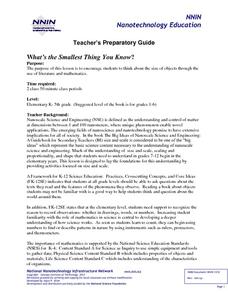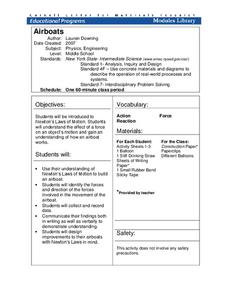National Nanotechnology Infrastructure Network
What’s the Smallest Thing You Know?
Elementary learners listen to a story, then sort objects from largest to smallest at six different stations around the classroom. Adaptable for a large range of age and ability groups.
Forest Foundation
Exploring Heat & Energy
How does fire keep itself going? Explore the ways that heat uses fuel and energy with a lesson about the fire triangle and combustion. Several activities demonstrate how heat moves from warmer objects to cooler objects, as well as the...
Curated OER
Wired with Alexander Calder
Kids consider how the body functions and moves, how each structure has a specific movement and purpose. They apply that idea as they construct a sculptural piece that moves. For inspiration they look to the work of Alexander Calder,...
Centers for Ocean Sciences
Ocean and Great Lakes Literacy: Principle 1
Is your current lesson plan for salt and freshwater literacy leaving you high and dry? If so, dive into part one of a seven-part series that explores the physical features of Earth's salt and freshwater sources. Junior hydrologists...
LABScI
Kinematics: The Gravity Lab
Falling objects can be brutal if you don't protect your noodle! Scholars explore the motion of falling objects through measuring short intervals to determine if the distance traveled varies with time. Building off of this, scholars...
LABScI
Conservation of Momentum: Marble Collisions
What happens to the momentum of an object when it strikes another object? Scholars roll a marble down a ramp so it collides with another marble. By measuring the speed of each marble before and after the collision, pupils answer this...
Hawaiʻi State Department of Education
Push and Pull
I love mixing arts lessons with core content! Here, the class will discuss energy, motion, and force (push/pull) as they review dance vocabulary and movements. They preview vocabulary for force and dance. Then they pair-up to dance a...
Columbus City Schools
It’s All Relative
Are the people on the other side of the world standing upside down? Pupils discuss the relationship between movement and position words. The unit explores the concept of reference points through animation, modeling, photography, and more.
Savvas Learning
Let's Get Moving
Scholars examine, cut, paste, and sort 12 images featuring different types of movement in order to show what they know about energy—potential and kinetic.
NOAA
Invent a Robot!
Wait til your class gets their hands on this! Aspiring engineers design a working robotic arm in the fifth and final installment in a series of ocean exploration lessons. Pupils learn about the use of underwater robots in ocean...
BBC
Sorting and Using Materials
First and second graders see that everyday objects are made from a variety of materials. They interact with objects such as keys, plastic spoons, a wooden ruler, a towel, and a plastic bag. A discussion ensues which leads them to...
Teach Engineering
Swinging Pendulum
Get into the swing of things. Pupils use a pendulum to demonstrate the conversion of potential energy to kinetic energy and back. After measuring the speed of a pendulum and compare it to the calculated theoretical speed, they determine...
Star Date
Shadow Play
Three activities make up a solar system lesson that features the sun, its light, and the shadows it produces. Scholars step outside to discover the changes shadows make at different times of day, take part in a demonstration of how Earth...
Curated OER
Doin' The Moonwalk
If you are looking for an outstanding lesson plan on the Moon for your budding astronomers, look no further! This outstanding plan is full of wonderful, meaningful activities for your charges to engage in. Pupils will discover why there...
Science 4 Inquiry
Investigating How Heat Flows
It is impossible to cool down a glass of water by adding ice. Young scientists explore heat transfer through videos, experiments, and interactive games. They quickly catch on that the water melts the ice and things aren't always as they...
LABScI
Potential and Kinetic Energy: The Roller Coaster Lab
Ron Toomer, a famous roller coaster designer, suffered from motion sickness. Pupils design their own roller coasters, learning about potential and kinetic energy in the process. Labs focus on the importance of drop height, energy...
Cornell University
Airboats
Don't let the resource blow you away. Scholars build airboats from basic materials and collect data on how far the boats move. They refine their designs taking Newton's laws into consideration.
NASA
Collecting Electromagnetic Radiation
Astronomy is literally over your head, but this lesson will explain how we study it. Young scientists make telescopes, calculate and compare the light gathering power of lenses, and simulate detection of infared radiation. Materials...
Curated OER
Seed to Soup Organic Garden
Have your young biologists visit decomposition stations as they explore the process of organic material. This activity involves some set-up as kids will be visiting 13 desks to collect colored paper each representing a different element...




















